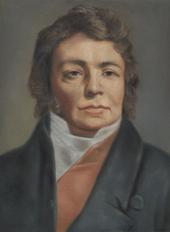Yours truly, when I was still rosy about the cheeks.
Actually, my main objective isn’t as selfish as you might think, and I most certainly am not here to boast. My purpose on MySpace is simple: I am here to bring attention to the great music of our past (with the hope of seeing it become more of an example for the future). (I saw that my good friend Wolfgang Mozart had tried it, so I thought, why not.)
I imagine it’s necessary to give a bit of biographical information, so here goes:
I was born on the 14th of November, 1778, in Pressburg, Austrian Empire, now Bratislava, the capital of Slovakia. My father, Josef Hummel, was the director of the Imperial School of Military Music and the conductor of the Theatre Orchestra there. As you can imagine, I got my love of music from him.
Wolfgang Amadeus Mozart, the eternal master (and the hardest-working composer that ever lived).
My father then led me on a European tour. When I arrived in London, I began receiving instruction from Muzio Clementi. I stayed for four years before returning to Vienna. In 1791, Joseph Haydn, who was in London at the same time as I, composed for me a sonata in A-flat. I premiered the piece for Haydn in the Hanover Square Rooms. Yes, what you’ve heard is true. For my performance, Haydn gave me a guinea (which, if I remember correctly, I spent on sweets).
The outbreak of the French Revolution caused me to cancel a planned tour through Spain and France. Instead I gave concerts to earn my way back to Vienna. After returning to Vienna, I received instruction from Johann Georg Albrechtsberger, Joseph Haydn, and Antonio Salieri.
My dear friend Franz Schubert. He never wrote a note I didn’t wish was my own.
Franz Joseph Haydn, whose work continues to endure.
I later held the position of Kapellmeister at Stuttgart and Weimar, where I formed a close friendship with Goethe and Schiller, colleagues of mine at the Weimar Theatre. During my stay in Weimar, I did everything in my power to make the city into a European musical capital, inviting the best musicians of the day to visit and make music there. I started one of the first pension programs for fellow musicians, giving benefit concert tours when musicians’ retirement funds ran low. In addition, I became one of the first to fight for musical copyrights against intellectual pirating.
While in Germany, I published A Complete Theoretical and Practical Course of Instruction on the Art of Playing the Piano Forte (1828), which sold thousands of copies within days of its publication and brought about a new style of fingering and of playing ornaments. (Some years after my death, I came to learn that my techniques were influencing 19th century pianists. This was made possible through my instruction of Carl Czerny – always a delightful pupil, as I remember – who later taught Franz Liszt.)
Franz Liszt, whose fearless style of playing characterized the piano virtuosi who came after me.
At the end of my life, I saw the rise of a new school of young composers and virtuosi. I quickly found that my own playing fell into disfavor. My Clementi style (characterized by a clean, disciplined technique) opposed me to the rising school of bravura and pyrotechnics displayed by the likes of Liszt and Giacomo Meyerbeer. I began to compose less and less, although I received much respect and encouragement from all directions. I died peacefully in Weimar in 1837.
In December 2005, the BBC aired a one-week feature on me and my works in their “Composer of the Week†series. Astonishingly, they devoted an hour a day for five days to me! It truly is remarkable how much affection one can receive after death.
But, like I said, I am not here to boast. I merely thought you should know how I fit into this whole puzzle we call life.
Yours in music,
Jan Hummel
